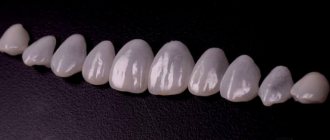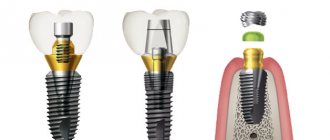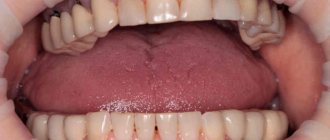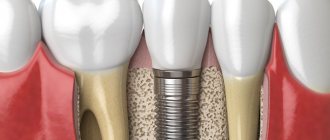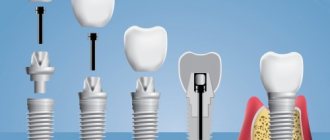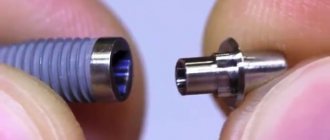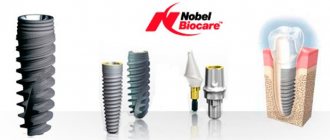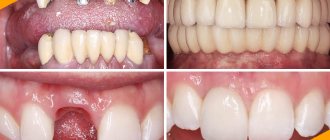- What is implantation
- Indications/contraindications
- Types of implants
- Factors affecting service life
- Why is there a risk of rejection?
- When to change
- Recommendations on how to extend the life of an implant
Among all types of dental reconstruction, implantation is considered the most complete and effective method, allowing you to restore one or more teeth and even the entire dentition. Because the procedure is expensive, the question often arises about how long dental implants last. The shelf life of artificial roots depends on several factors, which should be taken into account before implantation.
What is implantation
In the majority, people generalize methods for restoring teeth under the concept of “prosthetics.” This is not entirely correct. Implantation is a stage of reconstruction, which is the installation of an artificial root (implant), onto which a crown or solid prosthesis is subsequently attached.
Implantation is performed with an estimated period of 5 to 30 years. The service life of the product has the main influence on when the next dental implantation will be required, but there are a number of other factors that can shorten not the warranty period, but the actual service life.
In order to extend the period of wearing artificial roots, it is necessary to pay special attention to preparing for the procedure, to choose the right clinic/doctor and the products themselves, before carrying out the mini-operation to install the pins.
Recommendations from experts
Dentists recommend adhering to the following rules to extend the life of structures in the oral cavity:
- In the postoperative period, strictly follow the doctor’s instructions;
- Clean your teeth daily with a brush or paste;
- To effectively clean the subgingival area and interdental spaces, use an irrigator;
- Carry out timely treatment of diseases of the oral cavity and body;
- Treat your “new” teeth with care;
- In case of complications or pain, seek qualified help;
- Carry out a preventive examination and professional cleaning at the dentist 2 times a year.
Indications/contraindications
Implantation is carried out exclusively according to indications. The need to install artificial roots is determined by the dentist who examines the patient at the first appointment.
The need for implantation is confirmed in the following indications:
- missing one tooth;
- absence of 2 or more dental organs, with adjacent location;
- absence of the last teeth without the possibility of restoration by other methods;
- complete edentia (congenital pathology characterized by the absence of teeth);
- the presence of reasons preventing the wearing of a removable denture (for example, a gag reflex);
- pain caused by functional occlusion;
- absence of alveolar processes in the upper jaw with concomitant complete absence of teeth;
- anatomical defects that arise as a result of diseases, mechanical effects, as well as as a result of disturbances during intrauterine development or genetic predisposition.
In professional dentistry, the patient is additionally sent for diagnostics to determine contraindications:
- severe diseases of the cardiovascular system;
- malignant oncological diseases;
- diseases of the nervous system;
- blood pathologies (especially poor clotting);
- severe connective tissue diseases;
- open tuberculosis;
- liver/renal failure during exacerbation;
- increased tone of the masticatory muscles in combination with bruxism;
- diabetes mellitus;
- immunodeficiency diseases;
- allergic reaction to painkillers;
- age up to 18 - 22 years (depending on indications);
- addiction to drugs or alcohol.
If a patient undergoes implantation with contraindications, the shelf life of dental implants will be reduced to 1 - 2 months, or even several days. In case of contraindications, 90% of patients experience rejection of the structure with the development of associated complications.
How long will crowns and dentures last?
A denture or crown is the upper part of the structure that is installed on the implant. The service life differs from implants and is determined by the quality of the material from which the artificial tooth is made:
- Metal ceramics will last on average 10-12 years. Durable, but over time, cracks and chips of ceramics are possible on the surface. There is a possibility of allergic reactions to metal.
- Zirconium dioxide Durable, aesthetic, hypoallergenic material, manufacturers provide a 15-year guarantee. In practice, well-made crowns last as long as implants.
Our Center has its own digital dental laboratory, which produces individual dentures from zirconium dioxide.
Since 2012, the Center has a unique extended warranty of 25 years . Quality is achieved through the use of original materials and digital production technologies. Applies to maintaining integrity and color. If the rules of use are followed, zirconium dioxide crowns last a lifetime .
Types of implants
In dentistry, implants made of titanium material are used, since it is considered the most reliable and safe. All products are divided into several types according to design and shape. Depending on the indications, the most suitable installation option is selected. In addition to indications, the choice of implant model is also influenced by their cost. Modern designs tend to be more expensive, but more convenient and durable.
Based on the type of design, products are divided into two types: collapsible and non-collapsible. This characteristic affects the service life only due to the need to replace the crowns. Thus, fixed structures may require a complete replacement of the prosthesis after 5–16 years, while removable ones can last up to 12 years.
The duration of operation is affected by the shape of the artificial roots, since the reliability of the installation of the prosthesis depends on the type of implant.
- Lamellar - screwed into the bone tissue located under the palate;
- Root-shaped - installed in root canals;
- Combined - combine both previous types and are placed in the root canal.
Pins screwed into the root canal are considered the most durable, since with this type of installation it is possible to achieve excellent fixation.
Based on the material of manufacture, they are distinguished between ceramic-metal products with a guarantee of about 12 years, ceramic products - about 7 years, and metal-plastic products - no more than 3 years. There are also implants made of aluminum and zirconium, their service life is more than 15 years.
Service life of implants from manufacturers
- Alpha Bio – unlimited;
- Nobel Biocare – lifetime;
- Ankylos – unlimited;
- Adin – 5 years;
- Astra tech – unlimited term.
Factors affecting service life
Having decided to undergo implantation, you must first familiarize yourself with all the requirements for the reliability of products. The average service life of dental implants is 15 years, but when counting on installing a reliable design, you need to understand that the cost will not be cheap.
Criteria for the characteristics of implants:
- strength - resistance to constant loads;
- product quality;
- type of production technology;
- material of manufacture;
- installation method.
A major role, as already mentioned, is played by the patient’s health status. Before implantation, oral approval should be performed. The presence of even minor inflammation or caries suggests a risk of implant rejection.
An important point is the professionalism of the doctor. if the structure itself is not installed securely, then most likely the pin will move or fall out.
Manufacturer and Dental Warranties
When implanting, it is better to know well-known manufacturers that have positive reviews. As a rule, you can always find information about certain implants and how long the products of a given manufacturer last. However, it is worth considering that dentistry and the manufacturer give different guarantees, since the manufacturer is based on the characteristics of the product, and the dental company takes into account the operating conditions.
Implants come in budget, medium and premium classes. Manufacturers such as AstraTech, XIVE Friadent and Nobel provide a lifetime guarantee; their products are premium and have increased strength and healing rates.
Average-priced implants have a service life (from the manufacturer) of an average of 20 years. The manufacturer's warranty for artificial roots is no more than 10 years.
Dentists, as a rule, establish a guarantee of no more than 3 years, since patients often do not follow the doctor’s recommendations for care throughout the entire period of use. The guarantee provided is confidence in the work done by the doctor.
Lifetime guarantee for implantation at the Doctor Levin center
Typically, when undergoing implantation, the patient is faced with two types of guarantee:
- Manufacturer's warranty is determined by the quality of the material and the durability of the design. Applies only to the integrity of the implant.
- Clinic guarantee The obligations apply to the operation itself, usually not exceeding 2 years.
Since 2003, the Doctor Levin Center for Private Dentistry, together with Nobel Biocare, has provided a unique double lifetime guarantee in the Dr Levin LifeTime Warranty format . For the implant itself - from the manufacturer, for implantological treatment - from the clinic.
We work for
the perfect result !
The use of the best Nobel Biocare implants, the involvement of highly qualified specialists, the prevention of possible risks at each stage, strict adherence to the surgical protocol, scheduled annual medical examinations - all this allows us to guarantee the indefinite service life of implantation systems.
Levin Dmitry Valerievich Chief physician and founder of the Doctor Levin center
Why is there a risk of rejection?
No manufacturer or dentist can claim that an implant will not be rejected 100%, since sometimes a complication occurs simply due to the body’s individual reaction to a foreign body.
The guarantee provided by dentistry is to protect the patient from complications in the event of rejection:
- due to a doctor’s error during installation (failure to comply with sanitary standards, incorrect installation, etc.);
- due to inconsistency of product quality.
If the patient did not follow the recommendations, or the implant was rejected after 2 - 4 years or more, then we are not talking about a medical error or poor quality. Most likely, pathological processes are occurring in the patient’s body, which become the cause. In such cases, the clinic, of course, does not bear responsibility.
Note! According to statistics, implants are rejected in only 2% of patients.
How many years do implants last?
Every patient who decides on expensive implantation wants it to go without complications, and for the implants and prostheses to last the rest of their lives.
According to statistics, modern implants last more than 25 years . The main thing is to choose implantation systems from trusted manufacturers.
If the doctor took into account and prevented possible risks, the surgical protocol was followed during installation, and the patient followed the rules of hygiene during use, reinstallation of high-quality implants will not be necessary for the rest of his life .
When to change
After implantation, you should visit your dentist every 6 months. As soon as a specialist detects signs of product rejection or sees that the design no longer meets quality requirements, a decision is made to remove and possibly replace the structure.
Changing the implant is necessary if:
- pin mobility;
- severe pain at the attachment site;
- bleeding;
- severe swelling;
- signs of suppuration;
- swelling of the face in the area of implant installation.
If the patient himself notices such signs, then he should contact a specialist immediately. Similar symptoms can occur both in the first days and years later.
When is it necessary to replace dental implants?
The specialist evaluates soft tissues, inflammatory processes and other changes. The main reasons for replacement are:
- Injuries to the teeth, jaws or face that caused the implant to move or twist.
- Peri-implantitis is inflammation of the tissue around the implant. There is swelling of the gums, pain, pus, and an unpleasant odor.
- Rejection - a symptom is mobility caused by incorrect size of the structure, insufficient bone density and volume, peri-implantitis, allergy to metal.
If one or a combination of symptoms is diagnosed, the implant should be replaced immediately. Such symptoms are fraught with the development of serious life-threatening complications.
Recommendations on how to extend the life of an implant
The dental guarantee is not an indicator of the longevity of the implants. If the manufacturer indicates a service life of 20 years or more, then you should rely on this data. The implanted structure can last until the end of your life if you follow the recommendations for its use.
Expert recommendations on how to extend the life of dental implants:
- strict adherence to oral hygiene (brushing teeth twice a day, using mouthwash and special dental floss);
- prevention and treatment of dental diseases at the first signs;
- giving up bad habits (use of narcotic drugs is a categorical contraindication);
- undergoing professional teeth cleaning in dentistry;
- reducing the load on the structure when eating food (it is not advisable to gnaw, constantly chew, eat hard foods, etc.);
- Periodic visits to the dentist for preventive purposes.
The service life of the crowns can also be affected, since when the structure is changed, all its elements are replaced.
A-Medic Dental Clinic provides a guarantee for the installation of implants in accordance with the quality of the products. The specialists of our center have extensive experience in implantation, so we are confident in the work of our implantologists. We offer our patients a choice of implants from the most famous manufacturers at an affordable price.
Clinic and dentists
Dentistry is responsible for ensuring that the products offered to patients are original, certified and supported by research. Small dentists often want to save money and buy products cheaper, without paying attention to quality. Large clinics carefully select suppliers and check all documentation.
The success of implantation depends 80% on the skill of the doctor. Highly qualified specialists usually work in large dental centers. They regularly improve their skills and often teach themselves. Therefore, large clinics provide a guarantee on the work of doctors. This means that if the implant does not take root due to medical error, re-implantation will be free.
But even the best implantologist can miss important details if the image or CT scan is taken on a weak, old device. Therefore, it is important to choose a clinic with modern equipment, where the degree of resolution is high and the radiation intensity is low.
How should you care for implanted teeth?
Caring for implanted teeth is a guarantee of their long service life. They need to be looked after daily and fully. It is important to understand that the main part of the implant is located under the gum, and therefore crowns and dentures must be cleaned with special care. You need to brush your teeth not only in the morning and before bed, but also several times a day. It is advisable to do this after every meal. In this case, it is necessary to use not only brushes, but also dental floss and irrigators.
The oral cavity should also be regularly rinsed with strengthening elixirs. If you have implants installed, you need to see your dentist regularly, even if you do not feel toothache. Eliminate very hard foods from your diet.
So, what kind of implant should I install? Calm and once again - calm!
Absolutely all models of implants that specialists from the clinics of the German Implantology Center work with are installed only once and for life.
After some time, you will need to replace the crown - the wearing period depends on the selected material. The healing of dental implants produced by the above-mentioned premium brands, which are always at the first steps of the world dental rankings, is as gentle as possible, and the period of osseointegration is reduced.
Sign up for a consultation at one of our clinics, discuss the problem with your doctor and find out which type of implant is right for you.
General characteristics of implants
In dentistry, implants are commonly called dental implant systems. They are characterized by surface type, thread type and size, overall dimensions and fastening type.
The most durable dental implant systems are those whose surface structure is porous, the base is wide and the thread pitch is different. Such implants can withstand heavy and prolonged loads.
The sizes of implants are selected individually for each patient. This takes into account the thickness and density of the jaw bone. It should be said right away that even the slightest error in choosing the size is unacceptable. In this case, the implant will be rejected by the body. Rejection will be accompanied by pain and inflammation in the oral cavity.
What doctor’s mistakes lead to implant rejection?
And yet, practice shows that most implant rejections occur due to the fault of the doctor. Typical medical errors are the following:
- insufficient professionalism of the dentist;
- little experience in implantation;
- the implant design is incorrectly chosen;
- the technology of the operation was violated.
Taking into account the above, you should take full responsibility when choosing not only the clinic, but also the doctor himself. To avoid mistakes, check how long the clinic has been operating and what reviews there are from former patients. The same thing needs to be checked in relation to a specific dentist. Be sure to look at the entries in the guest book, which is available in each clinic. Read thematic forums on the Internet.
After this, you need to definitely talk with not one, but several doctors and choose among them the one in whom you will have complete confidence. After implantation is completed, you must strictly follow all recommendations received from your doctor.
